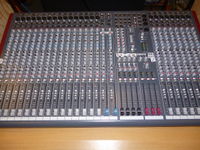Allen and Heath ZED 428: Difference between revisions
David.heaton (talk | contribs) m (Software correction) |
(→Known Faults: Update) |
||
| Line 26: | Line 26: | ||
== Known Faults == | == Known Faults == | ||
=== Past issues === | |||
The LR button on channel 25-26 | *The LR button on channel 25-26 caused some noise issues on the main LR channels. The entire of the channel seems to be mixed to the right regardless of inputs or pan setting. As the desk was under warranty, it was shipped off to a repair center in Germany. Channel now works fine, but has slightly brighter mute LED than the others. | ||
*Group 4 failed during [[hist:Battle of the Bands 2014|BoB 2014]]. As the desk was ''just'' still under warranty, it has once again been shipped to Germany for repairs. | |||
As the desk | |||
== Notes == | == Notes == | ||
Revision as of 20:28, 25 August 2014
The ZED 428 is a 28 channel (24 mono + 4 stereo) analogue mixing desk with 4 groups, 6 auxilary (aux) outputs, 2 matrices, and left, right and mono outputs (LRM). This is the main audio desk used in the studio. The power switch can be found by reaching down the back right of the mixer. It's round.
Key Specifications
- 24 mono inputs
- 4 stereo inputs
- 4 mono groups (can be configured as 2 stereo groups)
- 3 main outputs (LRM)
- 6 auxiliary outputs (2 pre-fade, 2 post-fade, 2 switchable)
- 2 matrix outputs (mixes groups and LRM)
- 4-band equalisation (or EQ, frequency-specific volume control) on each channel (sweepable/semi-parametric mid bands on the mono channels)
- Phantom power individually selectable on each mono channel
- Signal and peak indicators on each channel
- 2-track in
- 2-track out
- USB connections
Usage
Studio
Being the biggest, newest, shiniest audio desk we have, it is naturally used as our studio desk. Typically, two compressors are connected to the L+R outputs, with more compressors inserted into each microphone channel using the helpfully named 'INSERT' sockets. The matrices outputs feed the control room amplifier, and any two of auxes 3-6 can be used to feed the studio amp if 3+4 are switched to post-fader. PiVT (magic video box), the edit desk, the Mac, and whatever else we happen to be using to play URY on are usually connected to the desk in stereo - either through a stereo channel (blue fader) or a pair of mono channels with their "pan" knobs turned fully left and fully right.
OBs
This desk is often used for the larger OBs, mainly due to the unavailability of other mixers in the station. To aid in this (and to increase the life of the desk) there is a flight case for it. Please use it. In addition, the Technical Director must be informed if this desk is leaving the station for any reason.
Known Faults
Past issues
- The LR button on channel 25-26 caused some noise issues on the main LR channels. The entire of the channel seems to be mixed to the right regardless of inputs or pan setting. As the desk was under warranty, it was shipped off to a repair center in Germany. Channel now works fine, but has slightly brighter mute LED than the others.
- Group 4 failed during BoB 2014. As the desk was just still under warranty, it has once again been shipped to Germany for repairs.
Notes
USB
There is a USB-B port located on the desk. Without other software on the connected computer, the desk is configured as a recording/listening device - allowing for recording from the desk or playing out to the desk (possibly at the same time). Other options are possibly available with the right software, such as using the USB as an FX send/return, but this has yet to be tried.
Software
Included with the desk was a copy of Steinberg's Wavelab LE 7 - the CD should be in the technical pigeon-hole.
Other desks on campus
BandSoc also has one of these desks, which we have borrowed on occasion (Woodstock 2013). Just useful to know if a second one is needed.
